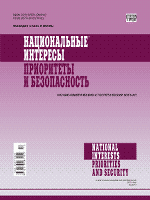Abstracting and IndexingРИНЦReferativny Zhurnal VINITI RAS Worldcat LCCN Permalink Google Scholar Online availableEastvieweLIBRARY.RU Biblioclub |
Enhancing the efficiency of State corporations of military-industrial complex
Available online: 21 September 2014 Subject Heading: STRATEGY OF ECONOMIC ADVANCEMENT JEL Classification: Pages: 19-26
The article describes the comparative analysis of economic indicators of the leading corporations in the missile area of the United States and Russia on the basis of the information available in the public domain. For a comparison, the authors selected the largest American company in this area: Raytheon from the United States and the European company MBDA. From the Russian side, they singled out Open Joint Stock Companies "Almaz-Antei" and "Corporation "Tactical Missiles Corporation". The authors of the study performed the main task to find the ways to enhance the economic efficiency of the State enterprises of the military-industrial complex of the Russian Federation. The methodology and tools of the research are based on collating and comparative evaluation of the activities of the leading corporations of Russia and NATO countries involved in the development and production of missile technology. These corporations provide their countries' military capabilities and compete with each other on the international arms market. The analysis revealed that the Russian missile corporation's labor productivity (output per worker) is significantly inferior to the same indicator of the Western corporations that forbids paying workers a decent salary and hampers measures to ensure prestige of work in this field. The authors draw the conclusion that in conditions of a rigid competition in the area of the missile weaponry, the Russian corporations need to significantly reduce internal and transaction costs (including measures to reduce the number of employees of all levels and enhance their skills), as well as they have to use extensive the diversification of businesses in the high-tech field. The experience, which is gained by the foreign missile production and aerospace firms in the area of diversification, confirms that the diversification of corporations of the military-industrial complex should be based on the use of their achievements in the research and development, unique equipment, highly qualified staff, which can ensure achieving of the sustainable positions in new markets. The authors point out that the level of the applied technologies and knowledge-intensive products are essential. The companies, which possess the high research intensity level of products, find themselves in more confident state while they apply the diversification. They have greater prospects for the development of dual-use technologies. Thus, those companies that use the diversification of production appropriately identify the core competencies of their corporation, and explore the possibility to apply them in the development of high-tech products. Keywords: Keywords: missile equipment, diversification, restructuring, stock shares price, labor productivity price, network enterprise References:
|
ISSN 2311-875X (Online)
|
|








